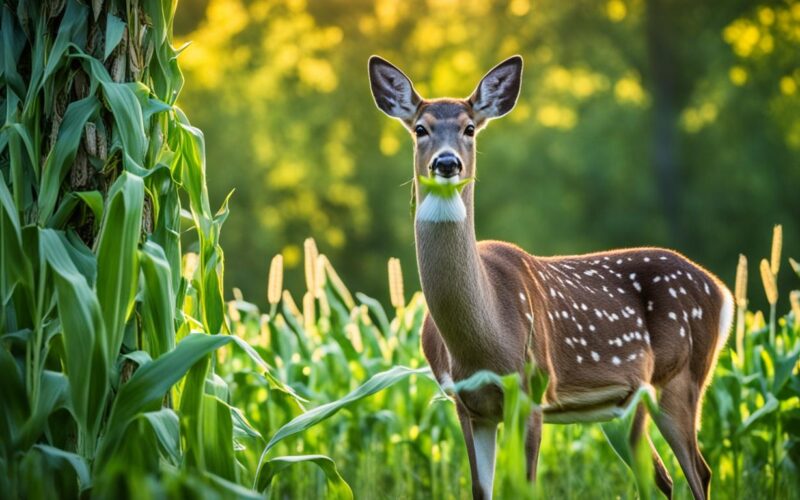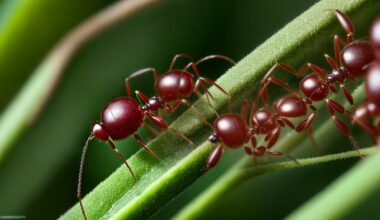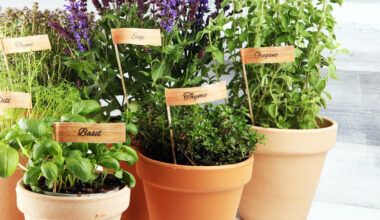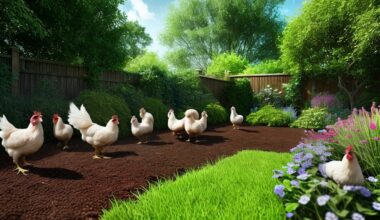Corn is often given to deer as a supplement, but what is corn nutritional value for deer. Its benefits and drawbacks are debated. It’s a good energy source but lacks protein (7-8%) and minerals. Feeding too much corn can lead to stomach problems and metabolic issues in deer. Yet, when part of a balanced diet, corn’s energy benefits can be useful. It’s important to understand how corn affects deer to use it wisely in deer management.
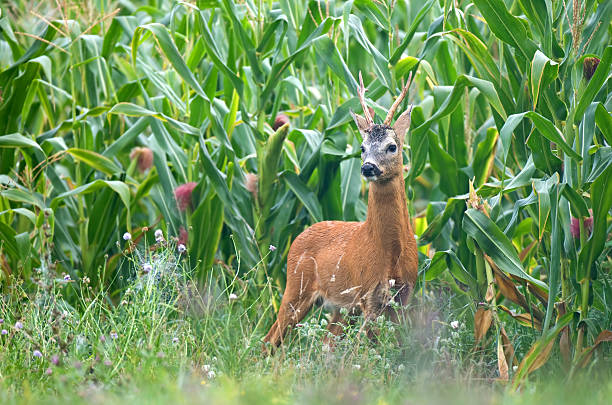
Does corn really help deer, or are there better foods for their health? Looking into corn’s nutritional value and effects on deer can help us make better choices for their care. This is key for those who manage wildlife and deer lovers.
Corn Nutritional Value for Deer
Corn is a key part of a deer’s diet. Deer has a special digestive system for breaking down plants. Corn’s high energy content makes it tempting but knowing how deer digest it is important.
Corn’s Nutritional Composition
Corn is mostly starch, which gives deer a lot of energy. But deer’s stomach isn’t made for a lot of starch. This can cause problems if they eat too much corn. Knowing about corn and deer can help people take better care of these animals. It’s important for their health and well-being.
- Corn is high in starch, which can increase acidity and potentially kill the bacteria necessary for proper digestion.
- Feeding deer straight corn after a long period of absence can lead to stomach acidity issues and stress their health.
- Corn’s high energy content makes it an appealing option, but it must be introduced and fed in moderation to avoid disrupting the deer’s delicate digestive balance.
Digestive Challenges of Feeding Deer Corn
Feeding deer too much corn or high-carb foods can cause serious digestive and metabolic problems.
- Rapid fermentation of starch can cause the rumen to become overly acidic, leading to rumen acidosis.
- Rumen acidosis can damage the rumen lining, allowing bacteria and toxins to enter the deer’s bloodstream.
- Short-term effects of corn-related digestive issues include loss of appetite, lethargy, diarrhea, bloat, and neurological problems.
- Long-term overconsumption of corn can lead to hoof problems and deformities in deer.
It’s important to watch out for deer digestive issues from corn. Managing what deer eat can help avoid these health problems.

Does Corn have Nutritional Value for Deer?
Corn can be good for deer if given in the right amounts. Deer can learn to eat just the right amount of corn. They choose high-fiber foods to balance their diet and slow down the corn’s digestion.
Studies show deer can eat 53-83% corn for 11 months without harm. It’s important to add corn slowly over 2-3 weeks. This lets their stomach get used to the starch.
This slow start prevents problems like rumen acidosis from sudden diet changes.
Corn can be a good extra energy source for deer when used right. It has about 9% protein, which fits well with their natural eating habits. Spreading the corn out or using timed feeders helps control how much they eat.
It’s key to make sure deer eat a mix of high-fiber, nutrient-rich foods with the corn. This way, deer get the corn’s nutritional benefits safely. It also helps avoid overconsumption and digestive challenges.
Proper Corn Feeding Practices
To feed corn to deer safely and beneficially, follow key practices. Also, offer a variety of other foods.
Gradual Introduction
Start adding corn to a deer’s diet slowly over 2-3 weeks. This helps their stomach get used to the new food. It also lowers the chance of stomach problems or other health issues.
Limited Intake
Watch how much corn deer eat and keep it in check. Use timed feeders or spread the corn out to slow them down. This prevents them from eating too much and the health risks that come with it.
Consistent Feeding
Feeding corn regularly is just as important. If you don’t feed them often, they might not adjust to the new food well. This could lead to health problems.
Diverse Forage Options
Offering different foods like leaves, fruits, nuts, and grasses is crucial. This helps deer get all the nutrients they need from corn. It also lowers the risk of stomach and metabolic issues.

By following these guidelines for feeding corn to deer, you can make sure it’s safe and good for them. Start slowly, don’t overfeed, feed regularly, and provide a variety of foods. This keeps deer healthy and happy.
Risks of Overconsumption
Even with proper feeding, deer can still eat too much corn and face problems. If a dominant deer dies, it might let another deer eat all the corn it wants. Young deer may also start eating corn as they get bigger.
Deer with health issues like parasites or infections can be more affected by eating too much corn. They might get hoof problems, diarrhea, and other health issues from eating too much corn.
Here are some reasons deer might eat too much corn:
- Sudden changes in social dynamics, allowing unrestricted access to abundant corn
- Young deer gaining access to corn for the first time as they grow larger
- Underlying conditions like internal parasites, infections, or disease making deer more susceptible to high-starch diets
Watching how much corn deer eat and knowing the risks can help prevent these problems. It’s important for their health and well-being.
Conclusion
Corn can be a great addition to deer management if used right. It’s a good energy source but has low protein and high starch. These can cause digestive issues if deer eat too much. To help deer, add corn slowly, keep feeding consistent, and offer other foods too.
It’s important to know how deer and corn interact to manage deer well. Eating too much corn can harm deer, causing serious health problems like lactic acidosis and dehydration. These problems can be deadly for deer. So, it’s key to watch deer closely and focus on their overall nutrition.
When using corn for deer, think about its role in their diet and the need for balance. Also, make sure to add corn carefully. By doing this, we can help deer stay healthy while using corn safely.

